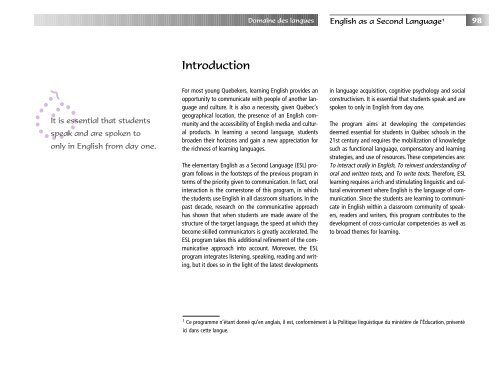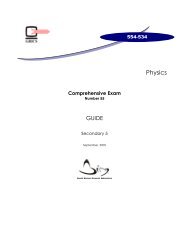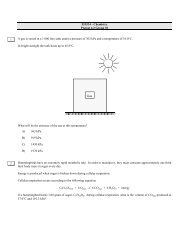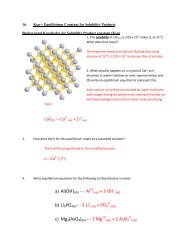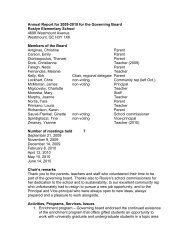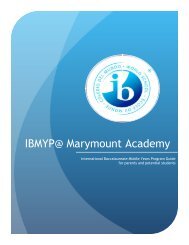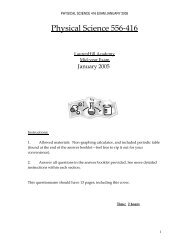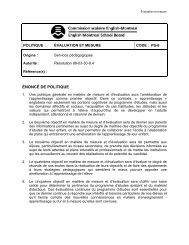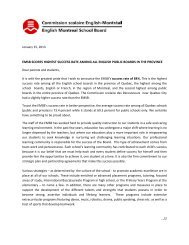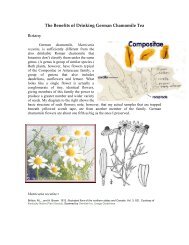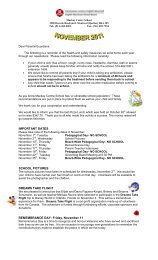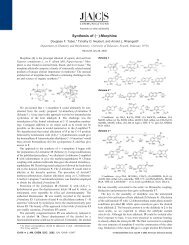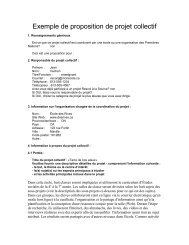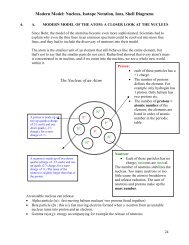- Page 2 and 3:
Programme de formation de l’écol
- Page 4 and 5:
Au personnel enseignant de l’édu
- Page 6 and 7:
Chapitre 1 Photo: Alain Désilets P
- Page 8 and 9:
équitable. Sa toute première resp
- Page 10 and 11:
Par savoir-agir, on entend la capac
- Page 12 and 13:
familial, en premier lieu, marquent
- Page 14 and 15:
1.8 LES ÉLÉMENTS CONSTITUTIFS DES
- Page 16 and 17:
Chapitre 2 Compétences transversal
- Page 18 and 19:
Le Programme de formation retient n
- Page 20 and 21:
COMPÉTENCE 1 • EXPLOITER L’INF
- Page 22 and 23:
COMPÉTENCE 2 • RÉSOUDRE DES PRO
- Page 24 and 25:
COMPÉTENCE 3 • EXERCER SON JUGEM
- Page 26 and 27:
COMPÉTENCE 4 • METTRE EN ŒUVRE
- Page 28 and 29:
Les compétences d’ordre méthodo
- Page 30 and 31:
Composantes de la compétence Analy
- Page 32 and 33:
Composantes de la compétence S’a
- Page 34 and 35:
Compétences transversales Compéte
- Page 36 and 37:
Compétences transversales Compéte
- Page 38 and 39:
Compétences transversales Compéte
- Page 40 and 41:
COMPÉTENCE 9 • COMMUNIQUER DE FA
- Page 42 and 43:
Photo: Alain Désilets Santé et bi
- Page 44 and 45:
Schéma 3 Domaines généraux de fo
- Page 46 and 47:
ORIENTATION ET ENTREPRENEURIAT Bien
- Page 48 and 49: Faire le partage entre ses besoins
- Page 50 and 51: INTENTION ÉDUCATIVE Développer ch
- Page 52 and 53: Chapitre 4 Éducation préscolaire
- Page 54 and 55: Les enfants inscrits pour la premi
- Page 56 and 57: Composantes de la compétence Crit
- Page 58 and 59: Composantes de la compétence Crit
- Page 60 and 61: Composantes de la compétence S’i
- Page 62 and 63: Composantes de la compétence Démo
- Page 64 and 65: Composantes de la compétence Démo
- Page 66 and 67: Composantes de la compétence Crit
- Page 68 and 69: STRATÉGIES (SUITE) - Comparer. - S
- Page 70 and 71: Chapitre 5 Domaine des langues 69
- Page 72 and 73: Photo: Alain Désilets Domaine des
- Page 74 and 75: évidence le rayonnement de la lang
- Page 76 and 77: Composantes de la compétence Const
- Page 78 and 79: Plus l’élève devient conscient
- Page 80 and 81: Attentes de fin de cycle PREMIER CY
- Page 82 and 83: LIENS AVEC LES COMPÉTENCES TRANSVE
- Page 84 and 85: Attentes de fin de cycle PREMIER CY
- Page 86 and 87: Composantes de la compétence Crit
- Page 88 and 89: TEXTES LITTÉRAIRES ET COURANTS (FO
- Page 90 and 91: CONNAISSANCES LIÉES AU TEXTE (SUIT
- Page 92 and 93: STRATÉGIES STRATÉGIES DE LECTURE
- Page 94 and 95: STRATÉGIES DE COMMUNICATION ORALE
- Page 96 and 97: TECHNIQUES • Apprentissage de la
- Page 100 and 101: Domaine des langues English as a Se
- Page 102 and 103: Domaine des langues English as a Se
- Page 104 and 105: Domaine des langues English as a Se
- Page 106 and 107: Domaine des langues English as a Se
- Page 108 and 109: Domaine des langues English as a Se
- Page 110 and 111: Domaine des langues Français, accu
- Page 112 and 113: Domaine des langues Français, accu
- Page 114 and 115: Domaine des langues Français, accu
- Page 116 and 117: Domaine des langues Français, accu
- Page 118 and 119: Domaine des langues Français, accu
- Page 120 and 121: Domaine des langues Français, accu
- Page 122 and 123: 122 Chapitre 6 Domaine de la mathé
- Page 124 and 125: Domaine de la mathématique, de la
- Page 126 and 127: Domaine de la mathématique, de la
- Page 128 and 129: Domaine de la mathématique, de la
- Page 130 and 131: Domaine de la mathématique, de la
- Page 132 and 133: Domaine de la mathématique, de la
- Page 134 and 135: Domaine de la mathématique, de la
- Page 136 and 137: Domaine de la mathématique, de la
- Page 138 and 139: Domaine de la mathématique, de la
- Page 140 and 141: Domaine de la mathématique, de la
- Page 142 and 143: Domaine de la mathématique, de la
- Page 144 and 145: Domaine de la mathématique, de la
- Page 146 and 147: Domaine de la mathématique, de la
- Page 148 and 149:
Savoirs essentiels Les savoirs esse
- Page 150 and 151:
Composantes de la compétence Éval
- Page 152 and 153:
Composantes de la compétence Éval
- Page 154 and 155:
Composantes de la compétence S’a
- Page 156 and 157:
Savoirs essentiels Les savoirs esse
- Page 158 and 159:
LA TERRE ET L’ESPACE (SUITE) •
- Page 160 and 161:
STRATÉGIES (SUITE) - Explorer dive
- Page 162 and 163:
Chapitre 7 Domaine de l’univers s
- Page 164 and 165:
Composantes de la compétence Crit
- Page 166 and 167:
Photo: Alain Désilets Domaine de l
- Page 168 and 169:
Le développement de ces trois comp
- Page 170 and 171:
Composantes de la compétence Étab
- Page 172 and 173:
Composantes de la compétence Atten
- Page 174 and 175:
Composantes de la compétence Justi
- Page 176 and 177:
GRILLES D’ÉTUDE DE DIFFÉRENTES
- Page 178 and 179:
LA SOCIÉTÉ IROQUOIENNE VERS 1500
- Page 180 and 181:
LA SOCIÉTÉ CANADIENNE VERS 1820 (
- Page 182 and 183:
LA SOCIÉTÉ FRANCAISE ET LA SOCIÉ
- Page 184 and 185:
DÉMARCHE DE RECHERCHE ET DE TRAITE
- Page 186 and 187:
190 Chapitre 8 Ces disciplines perm
- Page 188 and 189:
Domaine des arts 192 Savoirs essent
- Page 190 and 191:
Domaine des arts 8.1 Art dramatique
- Page 192 and 193:
chomotrices complexes, ce qui impos
- Page 194 and 195:
Composantes de la compétence Explo
- Page 196 and 197:
Composantes de la compétence S’a
- Page 198 and 199:
Composantes de la compétence Exami
- Page 200 and 201:
TECHNIQUES DE JEU (SUITE) - Rythme
- Page 202 and 203:
VOCABULAIRE action dramatique aire
- Page 204 and 205:
Domaine des arts Arts plastiques 21
- Page 206 and 207:
Domaine des arts Arts plastiques 21
- Page 208 and 209:
Domaine des arts Arts plastiques 21
- Page 210 and 211:
Domaine des arts Arts plastiques 21
- Page 212 and 213:
Domaine des arts Arts plastiques 21
- Page 214 and 215:
Domaine des arts Arts plastiques 22
- Page 216 and 217:
Photo: L’Imagier Domaine des arts
- Page 218 and 219:
De son côté, la compétence 3 est
- Page 220 and 221:
Composantes de la compétence Crit
- Page 222 and 223:
Composantes de la compétence Crit
- Page 224 and 225:
Composantes de la compétence Exami
- Page 226 and 227:
ESPACE • Espace personnel Niveaux
- Page 228 and 229:
RÈGLES RELATIVES AUX MOUVEMENTS D
- Page 230 and 231:
Domaine des arts Photo: François N
- Page 232 and 233:
premières compétences et met en v
- Page 234 and 235:
Composantes de la compétence Explo
- Page 236 and 237:
Composantes de la compétence Crit
- Page 238 and 239:
Composantes de la compétence Exami
- Page 240 and 241:
REPRÉSENTATION GRAPHIQUE (SUITE) -
- Page 242 and 243:
STRUCTURES (SUITE) • Tempo - Lent
- Page 244 and 245:
Chapitre 9 Développement personnel
- Page 246 and 247:
APPRENTISSAGES COMMUNS AU DOMAINE D
- Page 248 and 249:
Développement personnel Éducation
- Page 250 and 251:
Développement personnel Éducation
- Page 252 and 253:
Développement personnel Éducation
- Page 254 and 255:
Développement personnel Éducation
- Page 256 and 257:
Développement personnel Éducation
- Page 258 and 259:
Développement personnel Éducation
- Page 260 and 261:
Développement personnel Éducation
- Page 262 and 263:
Photo: Alain Désilets Développeme
- Page 264 and 265:
à comprendre ce qu’il vit pour
- Page 266 and 267:
Compétence 1 • COMPRENDRE DES SI
- Page 268 and 269:
Attentes de fin de cycle PREMIER CY
- Page 270 and 271:
Établir des relations entre ce qu
- Page 272 and 273:
Établir des relations entre son mi
- Page 274 and 275:
Composantes de la compétence Expli
- Page 276 and 277:
STRATÉGIES ET CONNAISSANCES UTILES
- Page 278 and 279:
Composantes de la compétence Crit
- Page 280 and 281:
CONNAISSANCES ET STRATÉGIES UTILES
- Page 282 and 283:
Photo: François Nadeau Développem
- Page 284 and 285:
L’enseignement moral et religieux
- Page 286 and 287:
Composantes de la compétence Explo
- Page 288 and 289:
Composantes de la compétence Crit
- Page 290 and 291:
DÉVELOPPEMENT PERSONNEL (SUITE)
- Page 292 and 293:
DÉVELOPPEMENT SOCIORELATIONNEL (SU
- Page 294 and 295:
DÉVELOPPEMENT SOCIORELATIONNEL (SU
- Page 296 and 297:
GRANDES QUESTIONS HUMAINES (SUITE)
- Page 298 and 299:
STRATÉGIES POUR PRENDRE POSITION D
- Page 300 and 301:
Développement personnel Enseigneme
- Page 302 and 303:
Développement personnel Enseigneme
- Page 304 and 305:
Savoirs essentiels Développement p
- Page 306 and 307:
Développement personnel Enseigneme
- Page 308 and 309:
Développement personnel Enseigneme
- Page 310 and 311:
Savoirs essentiels Développement p
- Page 312 and 313:
Développement personnel Enseigneme
- Page 314 and 315:
Savoirs essentiels Développement p
- Page 316 and 317:
Bibliographie 327
- Page 318 and 319:
REY, Bernard. Les compétences tran
- Page 320 and 321:
PIAGET, Jean. La représentation du
- Page 322 and 323:
DUFAYS, Jean-Louis, Louis GEMENNE e
- Page 324 and 325:
JOLIBERT, Josette, Catherine CRÉPO
- Page 326 and 327:
DEBLOIS, Lucie. « La numération d
- Page 328 and 329:
DEFOY, Gilles. L’activité à car
- Page 330 and 331:
LAVILLE, Christian. « L’épisté
- Page 332 and 333:
ARTS PLASTIQUES ARNHEIM, Rudolf. La
- Page 334 and 335:
REIMER, Bennet. Une philosophie de
- Page 336 and 337:
CONSEIL SUPÉRIEUR DE L’ÉDUCATIO
- Page 338 and 339:
Bonne nouvelle pour toi! La Bible e
- Page 340 and 341:
Notes
- Page 342:
13-0003-07 Photo: Alain Désilets M


